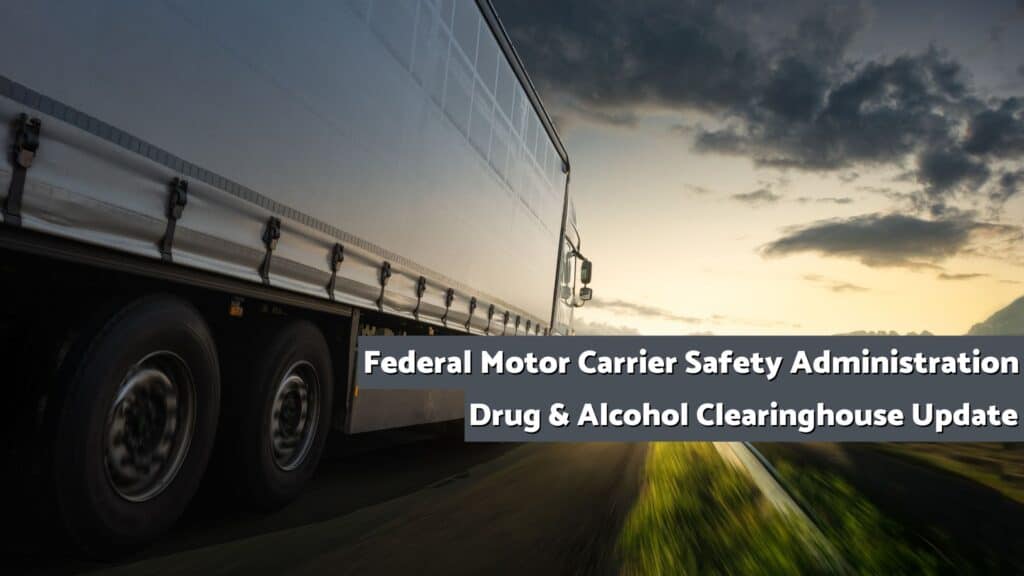(Re Drug & Alcohol Clearinghouse—DUI in a CMV)
By: Federal Motor Carrier Safety Administration (FMCSA)
If an employer reports a violation to the Drug and Alcohol Clearinghouse (Clearinghouse) based on the employer’s actual knowledge that a CDL driver was issued a traffic citation for DUI in a CMV, must the driver complete the return-to-duty (RTD) process before resuming safety-sensitive functions?
It depends on whether the driver is convicted of DUI in a CMV. Current regulations provide that, if an employer has reported an actual knowledge violation based on the issuance of a citation for DUI in a CMV, the driver is prohibited from performing safety-sensitive functions, including driving a CMV, until completing RTD requirements in accordance with 49 CFR part 40, subpart O (subpart O). (See 49 CFR 382.503(a) and 382.605.) Employers are prohibited from permitting a driver who has violated subpart B to perform safety-sensitive functions until the driver has complied with the RTD requirements in subpart O. (See 49 CFR 383.503(a) and 382.217(e).)
However, on March 8, 2023, the Federal Motor Carrier Safety Administration (FMCSA) issued a Notice of Enforcement Policy (NEP)(FMCSA-D&A-CLEAR-NEP(2023-03-08)). The NEP states that FMCSA will not enforce the RTD requirements of 49 CFR 382.503(a), 382.605, and 382.217(e) when drivers violate subpart B, based on their employer’s actual knowledge of the issuance of a citation for DUI in a CMV and the citation results in non-conviction.
The NEP also states that drivers who are convicted of DUI in a CMV must comply with the RTD requirements in accordance with subpart O.
What constitutes “non-conviction” for the purposes of the NEP?
As used in the NEP, the term “non-conviction” means that the charge of DUI in a CMV is dismissed without the imposition of fines, court costs or other punitive actions, or there is an unvacated adjudicated finding of not guilty. Terms that States may use to indicate a dismissal include Nolle Prosequi (Nolle Pros’d or Nolle Prossed), withdrawn, or discontinued. The term “non-conviction” does not include pleading guilty to a lesser charge (e.g., reckless driving).
May a CDL driver who received a traffic citation for DUI in a CMV resume performing safety-sensitive functions before non-conviction is established?
No. Drivers who wish to resume safety-sensitive functions before non-conviction has been established (i.e., before the citation has been dismissed or the driver is adjudicated not guilty) must comply with the RTD requirements in subpart O. Prior to non-conviction, an employer may not permit the driver to perform safety-sensitive functions until complying with RTD requirements.
How will FMCSA know that a driver’s citation for DUI in a CMV resulted in non-conviction?
To inform FMCSA of the non-conviction, drivers must submit acceptable documentary evidence of non-conviction following the procedures set forth in 382.717(c).
If the citation for DUI in a CMV results in non-conviction, when may the driver resume safety-sensitive functions?
Drivers may resume performing safety-sensitive functions when FMCSA accepts the documentary evidence and changes the driver’s operating status in the Clearinghouse from “prohibited” to “not prohibited.” FMCSA will notify the driver that this information has been added to their record, as required by 49 CFR 382.707(a), and the driver may then log into their Clearinghouse account to verify the status change.
Note: If the driver is required to complete the return-to-duty process due to multiple drug and alcohol program violations, including the citation for DUI in a CMV, the driver will be required to complete the return-to-duty process to resolve the other violations before resuming safety-sensitive functions.
If a driver’s citation for DUI in a CMV results in non-conviction and FMCSA accepts documentary evidence of non-conviction and changes the driver’s operating status from “prohibited” to “not prohibited,” must the employer comply with the Clearinghouse reporting requirements in 49 CFR 382.705(b)(1)(ii) and (v)?
No. Under the NEP, FMCSA will not enforce the employer reporting requirements for RTD and follow-up testing 49 CFR 382.705(b)(1)(ii) and (v) when a driver’s citation for DUI in a CMV results in non-conviction and FMCSA changes the driver’s operating status from “prohibited” to “not prohibited” based acceptable documentary evidence of non-conviction submitted by the driver.
Why is FMCSA changing its enforcement policy regarding actual knowledge violations based on the issuance of a citation for DUI in a CMV?
The change will increase fairness to drivers while continuing to ensure CMV safety. Issuance of a citation for DUI in a CMV is a serious action, which raises legitimate safety concerns that justify a driver’s immediate removal from safety-sensitive functions. The driver nevertheless should not be required to complete RTD requirements, including directly observed follow-up testing, if the citation results in non-conviction.
FMCSA (2023). Drug and Alcohol Clearing House. FAQs for Notice of Enforcement Policy Issued March 8, 2023. Retrieved from https://www.fmcsa.dot.gov/regulations/drug-alcohol-testing/faqs-notice-enforcement-policy-issued-march-8-2023-re-drug-alcohol
Contact Info: FMCSA Drug and Alcohol Clearinghouse, 1-844-955-0207 or clearinghouse@dot.gov
Regulatory Topic: Clearinghouse Notice of Enforcement Policy
Effective Date: Wednesday, March 8, 2022
Issued Date: Wednesday, March 8, 2022





